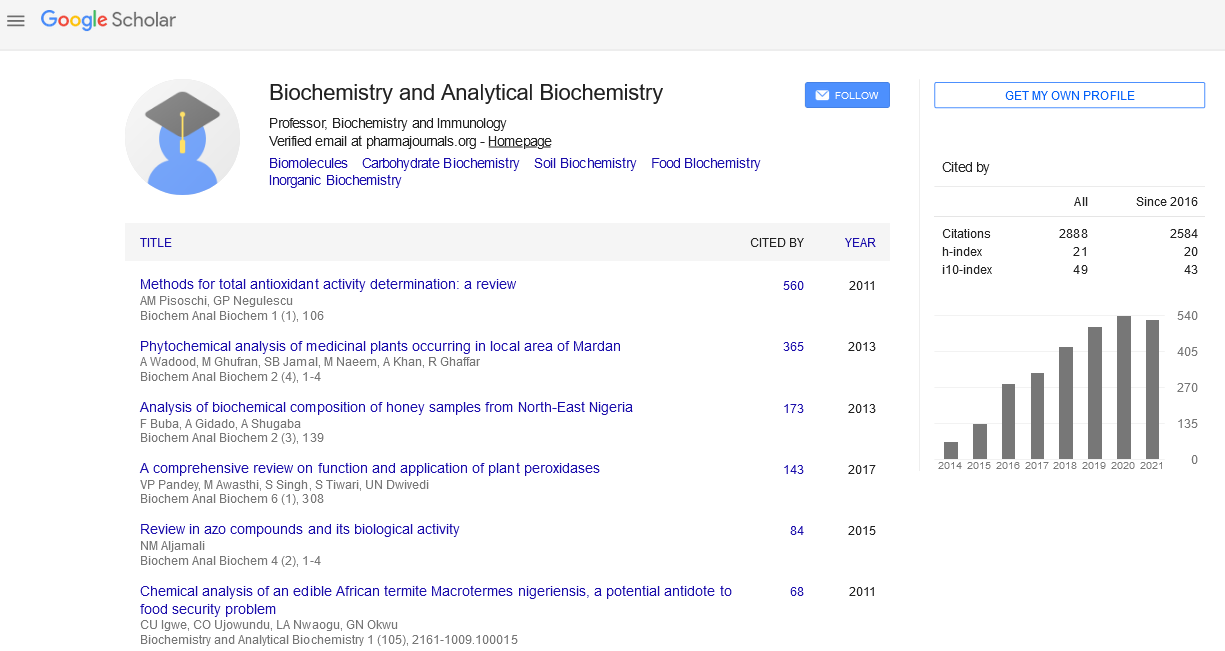Indexed In
- Open J Gate
- Genamics JournalSeek
- ResearchBible
- RefSeek
- Directory of Research Journal Indexing (DRJI)
- Hamdard University
- EBSCO A-Z
- OCLC- WorldCat
- Scholarsteer
- Publons
- MIAR
- Euro Pub
- Google Scholar
Useful Links
Share This Page
Journal Flyer

Open Access Journals
- Agri and Aquaculture
- Biochemistry
- Bioinformatics & Systems Biology
- Business & Management
- Chemistry
- Clinical Sciences
- Engineering
- Food & Nutrition
- General Science
- Genetics & Molecular Biology
- Immunology & Microbiology
- Medical Sciences
- Neuroscience & Psychology
- Nursing & Health Care
- Pharmaceutical Sciences
Multi-functional molecular hydrogen acting as an anti-oxidant, anti-inflammation and energy metabolism-stimulator
International Conference and Exhibition on Biochemical & Molecular Engineering
October 07-08, 2013 Hilton San Antonio Airport, TX, USA
Shigeo Ohta
Accepted Abstracts: Biochem Anal Biochem
Abstract:
We have proposed that molecular hydrogen (H 2 ) has potential as a novel antioxidant in preventive and therapeutic applications. H 2 has a number of advantages as a potential antioxidant: H 2 rapidly diffuses into tissues, cells and organelles exhibiting very efficient anti-oxidative effects, and it is mild enough neither to disturb metabolic redox reactions nor to affect reactive oxygen species (ROS) that function in cell signaling, thereby, there should be little adverse effects of consuming H 2 . There are several methods to ingest or consume H 2 , including inhaling hydrogen gas, drinking H 2 -dissolved water (hydrogen water), taking a hydrogen bath, injecting H 2 -dissolved saline (hydrogen saline), dropping hydrogen saline onto the eye, and increasing the production of intestinal H 2 by bacteria. Since the first publication of ours on hydrogen medicine in 2007, the biological effects of H 2 have been confirmed by more than 200 publications mainly using various model animals. H 2 improves oxidative stress by not only direct reactive elimination of highly oxidative molecules, such as hydroxyl radicals and peroxynitrite, but also modulating gene expressions involved in the redox system. Additionally, H 2 shows various anti-inflammatory and anti- allergic effects. Moreover, H 2 stimulates various gene expressions including fatty acid metabolism and protein-phosphorylations. A considerable number of clinical groups have started clinical examinations. Some open clinical studies strongly suggest potential for clinical applications. In particular, we have published an exciting paper suggesting the potential for improving Parkinsons disease in randomized double-blind, placebo-controlled trial.
Biography :
Shigeo Ohta has completed his Ph.D. at the age of 27 years from the University of Tokyo, Japan, and postdoctoral studies from Biocenter, Basel University, Switzerland. He is the Chairman of Department of Biochemistry and Cell Biology, Institute of Development and Aging Sciences, Nippon Medical School. He has published more than 200 papers in reputed journals and serving as associate editors of Mitochondrion and Medical Gas Research.


